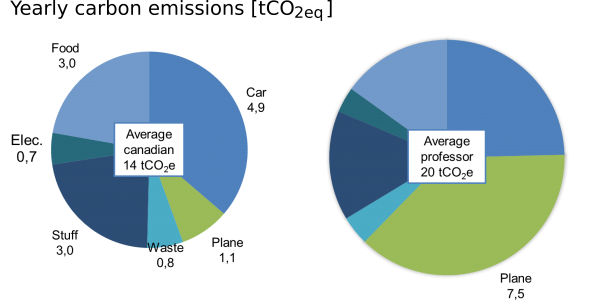
Rethinking the way we fly
– By Mathilde Jutras –
Climate scientists, like CMOS members, fly a lot. Actually, they even fly a bit more than other scientists (5 flights per year compared to 4 for other disciplines). These travel habits come with an immense carbon footprint, somewhat in contradiction with the message on climate change we are trying to convey to the public and decision-makers. In discussing with my colleagues, I realized how this question was extremely sensitive. Right now, the COVID-19 pandemics imposed a pause on our travel habits and allowed us to test new ways of collaborating remotely. Maybe this is a good time to think about what new normality we want to go back to.
The numbers are clear: flying is a major source of GHG emissions, especially for academics (in this article, I refer to academics by including graduate students). Flights represent 90% of academics’ work-related emissions and approximately 50% of a typical Canadian research’s total annual emissions. By the way, these annual emissions are 17 tons above the required limit to respect the Paris agreement (3 T/year). Simply by stopping to fly, academics could therefore reduce their carbon footprint in half. In Canada, professors travel on average 30 000 to 45 000km per year, for 5 to 7.5 tons of CO2 emissions. The emissions are more important the more advanced you are in your career. These data consider all departments, but a UBC study showed that « green » departments do not fly less than the others. Many studies show that this type of behaviour harms the message that scientists studying environmental questions try to convey. The scientists who fly a lot are perceived as 75 % less credible than their colleagues who fly little, and the difference is even higher if we take into consideration their home lifestyle.

While travelling has this inevitable environmental footprint, its advantages on research are clear. We can think of essential data collection, the development of collaborations, etc. While completely abolishing academic travel is not desired, there are many problems and absurdities that we can easily address and that would induce a significant improvement. First of all, the UBC study showed that 5 to 10% of the flights are easily avoidable, as they are displacements over short distances – which could have been made with a terrestrial means of transportation – or were one day round trips – that could not have offered the networking advantages of attending in person. Second, the main reasons for travelling at Université de Montréal are conferences (67%), fieldwork (18%), and academic tasks (7%) such as attending thesis defences and supervision committees. This last category could easily be replaced with virtual participation. For conferences, every academic has experienced at least one conference that was not that useful. We should also not deny to ourselves the appeal of conferences as a chance for a pleasant get-away, often in attracting destinations from a touristic perspective. It might be time to focus on events that are really beneficial for research and career advancement. Moreover, a recent study showed that, above one flight per year, there is no correlation between the number of flights per year and a number of metrics of academic success. This might be something to reflect on…
By launching the Responsible Research initiative, I visited a few departments and presented the numbers on the environmental impact of our travel habits to academics from different disciplines and career levels. Apart from hopefully raising awareness of a couple of people, I was able to gauge the opinion of the community. Many researchers mentioned the stress of travelling repeatedly, inequities for researchers who are parents, and the reduction of time allowed to actual research. Some researchers see the immense carbon emissions as an obvious problem and are ready to adhere to radical measures. Others are still uncomfortable thinking about reducing our travel. And the departments from which these points of view come might surprise you. The debate often came back to the pressure to travel, deeply rooted in the academic culture. This pressure largely comes from the strong valorization of long lists of presentations and international research stays in a researcher’s CVs. To avoid punishing the ones who choose to travel less (who want to observe the values in line with their research topic), we will need a transformation of these evaluation methods. Luckily, this is possible, as most of the evaluation is made by peers. Hence, even if institutional policies and funding agencies have a role to play, all members of the community have the power to initiate the change from the bottom, starting simply with awareness.
To conclude, academics’ flying habits represent enormous carbon emissions, impact our credibility as scientists, and it is not clear that travelling that much is beneficial for research and careers. Hence, it is essential to rethink our flying habits. Some solutions are simple, like favouring terrestrial transport for short distances (that emit much less carbon), extending stays to reduce their frequency, and thinking twice before registering for the umpteenth conference. COVID-19 showed us that it was possible to collaborate and exchange without any physical displacement. While the tools and practices are still to be perfected, we should not reject everything when the situation is back to normal, and rather take advantage of the situation to incorporate these tools in our research habits. These solutions must however go hand in hand with changes in the academic culture, to make sure those who make the eco-friendly choices are not penalized. Finally, as I would do at the end of my presentations, I now invite you to join the movement and sign a flight-reduction pledge: https://recherche-resp-research.github.io/.
Mathilde Jutras is a PhD candidate in oceanography at McGill University. She studies deoxygenation in the St. Lawrence Estuary and in the western North Atlantic. She launched the Responsible Research initiative in 2019 to raise awareness of academics to the carbon footprint associated with their travel.
